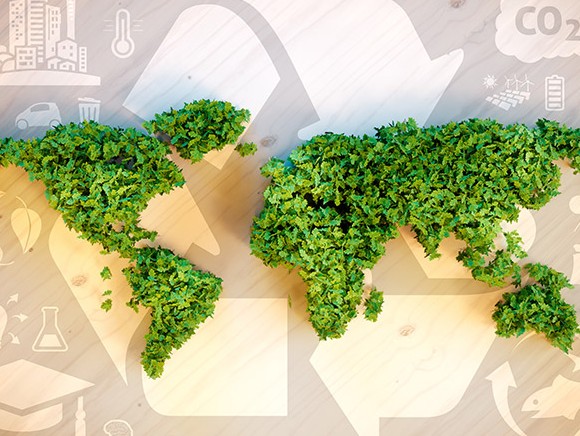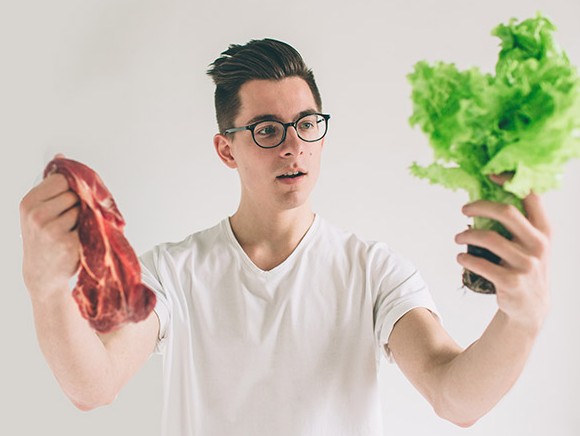
Food is responsible for 20-30% of worldwide greenhouse gas emissions according to the RIVM (National Institute for Public Health and the Environment). In order to bring the greenhouse gas emissions of the food production system within acceptable limits, it is important that food production and consumption are made sustainable.
By signing the Paris Accord, the Netherlands also committed to attaining the 17 Sustainable Development Goals (SDGs) (see also www.sdgnederland.nl).
This contains an action plan for human, planet, and welfare which includes a necessary end to climate change. Three SDGs have a direct link to the food sector: SDG 2: “End hunger, achieve food security and improved nutrition and promote sustainable agriculture;” SDG 12: “Ensure sustainable consumption and production patterns;” and SDG 13: “Take urgent action to combat climate change and its impacts.” The intention is to achieve all the goals by 2030.
The Netherlands is in good shape with regard to the 17 Sustainable Development Goals, which has been indicated in studies by PBL, OESO, and SDSN/Bertelsmann. The latter study puts the Netherlands in eighth place internationally. The first measurement (on 4 November 2016) by the Central Bureau for Statistics (CBS) indicates that the Netherlands typically comes in high in the European rankings. “The Netherlands is doing well in many areas. However, there are still challenges in others, such as climate protection, renewable energy, and the carbon footprint elsewhere in the world,” says CBS. “The Netherlands has a high level of food production, but scores low in the sustainability of this production.”
The Sustainable Brand Index
The Sustainable Brand Index and the associated research evaluate consumer markets in various sectors (including retail, foodstuffs, banks, travel and leisure) for “how sustainable they are perceived by consumers” and a ranking is created from this information. The Online Knowledge Centre for Corporate Social Responsibility (www.duurzaam-ondernemen.nl) is the index’s media partner in the Netherlands. On 19 April 2018, the second Dutch Sustainable Brand Index will be launched in Pakhuis de Zwijger.
www.sb-index.nl
Aalt Dijkhuizen, president of the Alliantie Verduurzaming Voedsel (food sustainability alliance), views that much more positively. When he gave his book “Het klimaat op ons bord” (climate on our plate) to Carola Schouten, Minister of Agriculture, Nature and Food Quality in early March, he said: “The Dutch agrifood sector is achieving the lowest impact on the environment, climate, and biodiversity per kilogram of food. In doing so, it is an exceptional example of what the world needs and what the Paris Accord demands. Thanks to new knowledge and smart technology, further improvements are possible and necessary, too. The book is loaded with examples of food businesses with smart solutions for increasing sustainability. Together with research institutions, the alliance has mapped out “hotspots” for the main resource and product chains: areas where the greatest impact can be achieved by improving sustainability. These hotspots, as well as the concrete steps that businesses can take, can be found at www.verduurzamingsvoedsel.nl. Those who feel that their initiative or innovation in the field of sustainability is inspiring enough to gain international fame can compete for various awards (see the areas).
ABN AMRO Circular Food Award
The ABN AMRO Circular Food Award is presented during the Netherlands Food Service Institute Summer Conference (on 27 June 2018) to businesses in food service, food retail and production who are successfully increasing the speed of the circular economy. “The current consumption pattern brings the boundaries of what the planet is capable of handling into view. The transition to a circular economy is crucial,” says the organisation. “Cycling up resources and waste streams are just gaining ground, which applies to food sources as well. Inspiring, scalable initiatives are required to accelerate the circular economy.”
www.insights.abnamro.nl
One of the objectives of the Paris accord is decreasing CO2 emissions. For the post-2023 period, the national government outlines the transition to low-CO2 energy provision in the Energy Agenda for 2050. The CBS indicates that the greenhouse gas and CO2 emissions per Dutch person is relatively high. Although the greenhouse gas emissions per resident is declining sharply, this remains relatively high due to the degree of industrialisation and the concentration of energy-intensive industry in the Netherlands. In the national government’s Energy Report, it provides an outline for the future energy policies in the period up to 2050. In the Rutte III government agreement, the cabinet is focused on halving CO2 emissions (-49%). This goes a bit further than the current European goal of 40%.
The cabinet also supports the ambition of various businesses, social organisations and research institutions to halve the amount of food thrown away by households, businesses, and restaurants by 2030. Each year, it is estimated that two million tonnes of food is wasted in the Netherlands. Less waste will ensure a substantial reduction in CO2 emissions and will save money. Minister Schouten of Agriculture, Nature and Food Quality announced that the cabinet will be releasing 7 million euros in the upcoming 4 years for innovation, research, monitoring and information. The forces, networks and knowledge from a task force of businesses, government bodies and social organisations will be combined to find innovative solutions. This Task Force for Circular Economy in Food currently consists of 25 members. It is expected that the number of associated organisations will quickly increase in the years to come. Another prominent component of the approach is the “United against food waste” campaign.
In order for the new approach to be successful, Minister Schouten wants to smooth out or eliminate laws and regulations where necessary. She is calling for an expansion of the European list of products that do not require an expiry date. The Netherlands does not want to be required to state “best-by” date on products with long shelf lives such as rice, pasta, coffee and mineral water. The minister also wants to work with the business community to ensure that the shelf life of products is clearer to consumers.
It is not only the government that stimulates sustainable enterprise and determines the agenda. Consumers are making themselves heard more often, specifically “Millennials” (the generation born between 1980 and 2000). Research shows that sustainability has a substantial or decisive impact on the buying behaviour of 39% of Dutch millennials. In short, “Sustainable enterprise” can no longer be ignored, especially not in the food sector.

King Willem I Plaquette
On Tuesday 3 April 2018, the twelve sustainable businesses were announced that are in the running for the prestigious King Willem I Plaquette for Sustainable Enterprise.” This will be held on the Wageningen University & Research campus, which was recently named the greenest, most sustainable campus in the world. The winner will be declared on Monday 28 May. This independent entrepreneurial prize is actively supported by the Ministry of Economic Affairs & Climate and the Ministry of Infrastructure and Water Management.
www.kw1prijs.nl
Source: Beeld landkaart: ©PETRMALINAK/SHUTTERSTOCK.COM, Beeld man: ©ESTRADA ANTON/SHUTTERSTOCK.COM